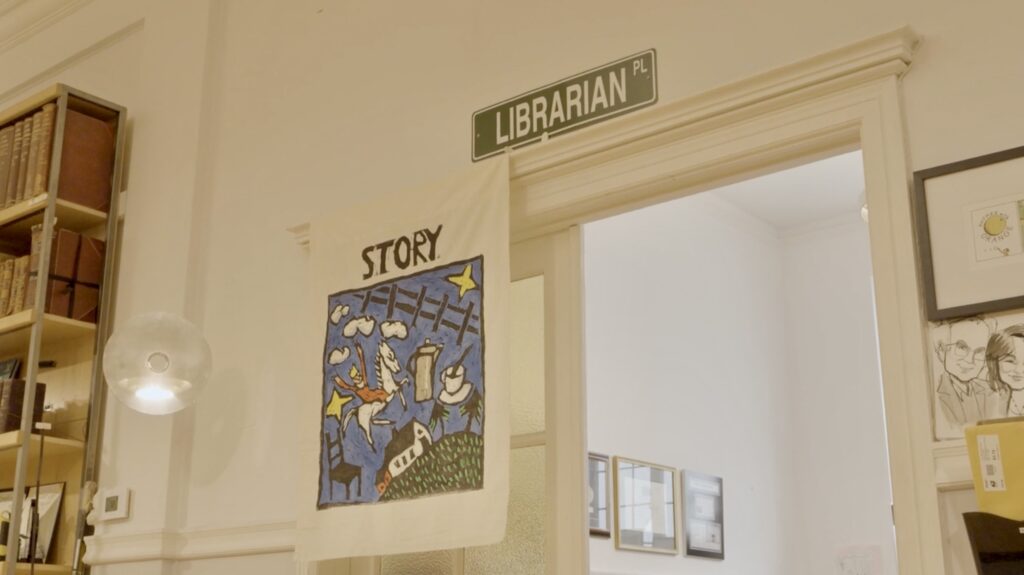
💬
互联网档案馆(Internet Archive)创建于1996年,总部位于美国旧金山,长期为公众提供免费访问和下载的数字化纸质文本服務。2020年,由于在全球疫情期间推出每本电子书可供一万名用户借阅的“National Emergency Library”,全球四大出版商指控互联网檔案館通过扫描纸质文本并向用户公开内容侵犯了著作权。2023年夏天,拍摄组访问了互联网档案馆创始人Brewster Kahle,谈谈互联网档案馆项目的现状和背景,及其如何在大企业文化中作为“嬉皮”的后裔生存下来。
*
这是我的办公室,我是互联网档案馆的”馆长”,致力于建立一个包罗万象的图书馆,一个数字化的亚历山大图书馆。
互联网档案馆是那些嬉皮士项目的直接传人,目标是让人民重新掌握权力。互联网档案馆源于互联网和万维网,在电子公告板之后,作为这一传统的一部分。互联网档案馆在支持和提供机构知识方面发挥着重要作用。我们归档旧思想并使其可用,让新一代年轻人能够接触到这些资料,他们也渴望这些原则。他们如何从过去中学习呢?
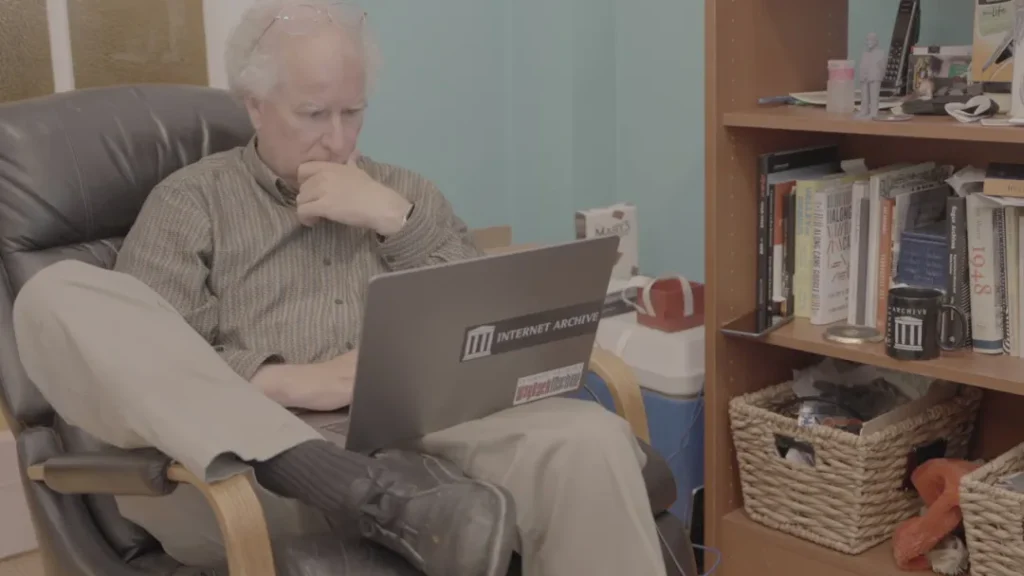


互联网档案馆项目源于互联网的愿景,让每个人都拥有为自己掌握权力的能力,去学习他们想学的任何东西,还要发布,让每个人都成为出版者。这个想法其实来自于(也许是)早期的印刷术,但后来被大型出版商所垄断。个人电脑的出现推动了这个理念——你可以为自己制作一台电脑——这在当时的从众时代是一场革命。
当我还在上大学时,我们会花时间思考辍学组建公社,以及如何让社会更好地运作?如何让人们活得更有意义?通常这意味着没钱、没有太多束缚住我们的组织和机构。所以是的,我是那个世界的一部分,或者至少是嬉皮士末期的一部分。嬉皮士末期正是个人电脑和互联网真正诞生的时期。
我那时还太年轻,错过了嬉皮士最鼎盛的时期,但很多原则仍然影响着我们。比如“让我们把时间和生命用来建立一个属于人民的事业”,又或者”让我们在一个多赢的游戏中,不会只有一个赢家通吃而其他人都被碾压”……这些原则指引了我的一生。当我成年后,我发现我擅长技术,那么,我应该如何利用技术来创造一个更好的世界?建立一个图书馆的想法似乎是一件很自然的事,所以我把一生都献给了建立一个包罗万象的图书馆,包括那些先驱者的梦想。这样,人们就可以从中学习,而不是被那些不希望你知道的人彻底抹去。

个人电脑的一个关键特点是它是一台通用机器,只要通过编程,它就能做任何你想做的事。这与视频游戏平台不同,后者只能播放公司告诉它的内容,甚至你的手机也是如此,它们基本上被控制和锁定了。个人电脑是开放的,这是出版或新闻自由的关键概念,也是图书馆的来源。互联网档案馆完全依赖于这种开放性,这种开放性赋予人们控制权,而不是由制造设备的公司来控制你必须使用的东西。
互联网档案馆生存在这些大公司的文化中,但我们是旧金山的老嬉皮士,对吧?我们是老派的,让我们找到方法把它免费提供出去,让我们找到方法把人们联系起来,不一定要让每个人为每件事付费,不是所有东西都需要货币化,它不是风险投资结构的一部分。你不是为了卖出去,不是为了赚几百万而做这件事。在这里工作的人对分享和帮助社区感兴趣,我们希望帮助许多社区蓬勃发展。这是“旧金山“精神的一部分在这个组织中的延续——在互联网的许多角落里也是如此,也许它们规模很小,但梦想仍在继续。让我们培育它们,创造结构,这样,下一代个人电脑就能诞生,得到支持并成长。
当新事物出现时,有时会让一些习惯于剥削他人的人感到不安。如果有一种变化使权力更多地转向人民,而不是公司或政府,他们就会反击。我们实际上已经允许互联网成长和变化了很长一段时间,无论是电子公告板还是其他形式。一路上仍然有斗争,但我们现在看到政府和公司正在强烈推动,试图关闭我们已经习惯的自由——以这样一种方式——我不知道他们怎么想,他们难道可以把时间倒流,让所有控制权都掌握在他们手中吗?这是一场持续的斗争,互联网档案馆是互联网中为人们的访问权而战的一部分。

对我来说,最难的部分是当人们表现得很刻薄时,当他们想要压制其他人时,没有真正的理由,只是出于企业贪婪,看到这一点真的是最难的事情。总的来说,互联网档案馆项目里的人们一直在道谢,因为它是一种慈善,一种传播信息的方式,一种保存事物的方式。但也有一些人只是试图压制互联网档案馆或维基百科或开源软件。他们只是觉得这是他们所在的公司或政府想要他们做的事。我觉得这非常令人悲伤。
我因人们对我的感谢而活,这给我满足感,让我精神振奋。我们做图书馆互借,我们获取文章和书籍章节,我深夜工作,确保人们能够访问这些资料,人们会回来说谢谢你所做的一切。有12万人向互联网档案馆捐款,有时是3美元,有时是5美元,他们经常写一个小便条说明原因。我很高兴我们能找到方法帮助人们,让人们通过过去的历史,通过早期互联网创始人,期个人电脑制造者,业余无线电爱好者口述史来找到自己。这些人正在激励新一代,这就是让我每天早上精神振奋地起床,想要去做这件事的价值所在。
一开始,它(技术)只是让我们能够接触和感受到以前从未真正触及的世界,但现在,它正在成为我们的一部分——脸书就像粘在我们的手机上或甚至脸上。我们谈论着植入物,我们在谈论我们只是这个网络世界的一部分。我不确定现在的年轻一代是否知道那种感觉,可能就像你总是在露营一样。每个人都在露营,因为他们彼此是连接的。这就是他们的生活。现在我们有了这种超级连接,它有好有坏,因为它伴随着一定程度的监视,要求人们随时回应。所以,我们需要不断创新,否则我们将作茧自缚。
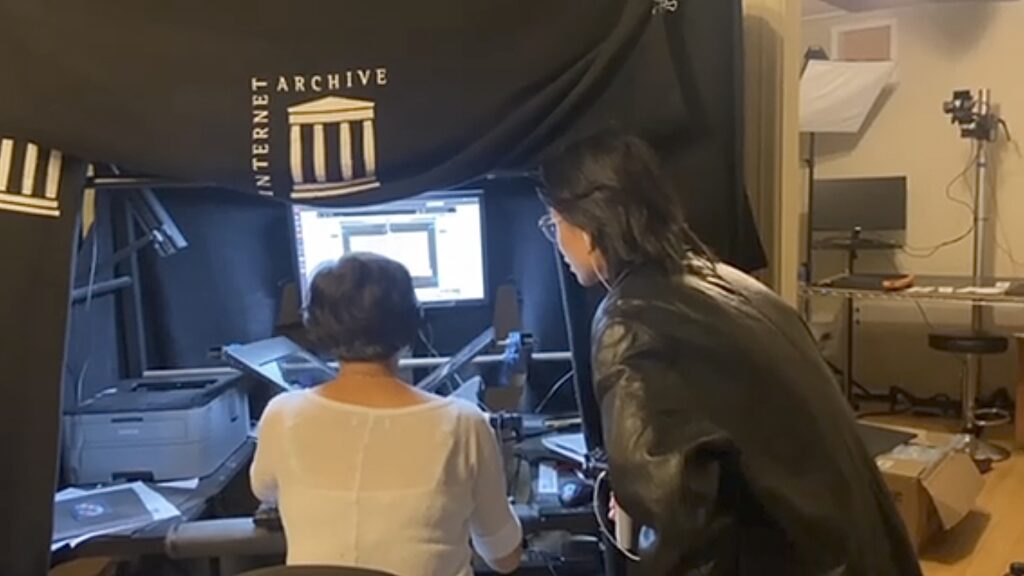
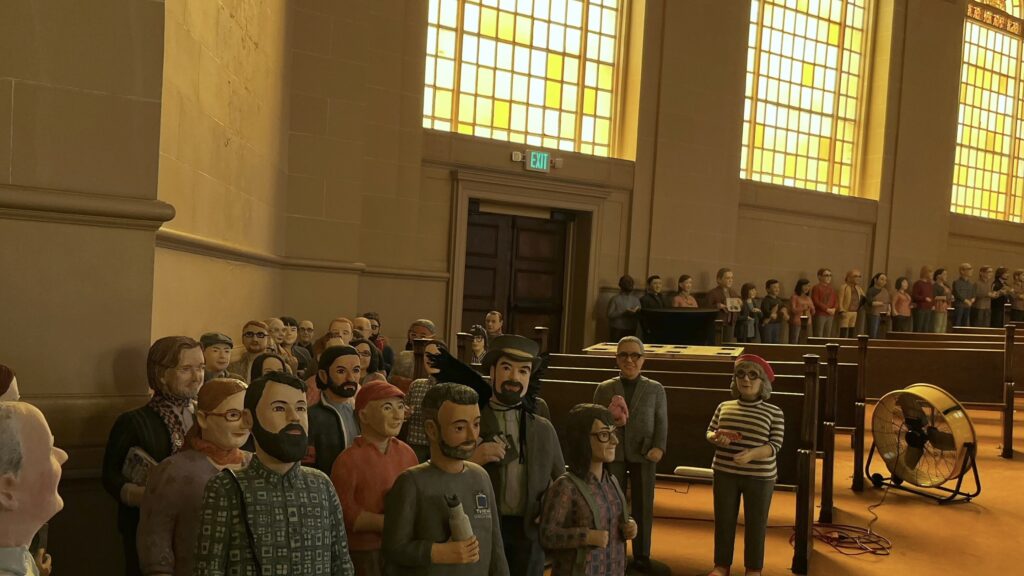
(原访谈英文)
This is my office here, and I’m the librarian of the Internet Archive and trying to build a library of everything, a digital library of Alexandria.
The Internet Archive is a direct descendant from those hippie projects to go and take back the power for the people. So the Internet Archive, by being from the internet and the world wide web after the bulletin boards, is sort of in that inheritant. And as part of that, the Internet Archive plays a role in supporting and believing in, providing institutional knowledge, archiving the old ideas and making it available to the new young generation that want these principles themselves. How can they learn from the past?
So the Internet Archive project came out of the visions of the internet of having everyone have power for themselves to go and learn whatever they wanted to learn, but also to publish, to go and make everyone a publisher. This idea really came from, you know, maybe the early days of printing, but then that gets corrupted by large scale publishers. And the personal computers was a boom in the idea that you can make your own computer for yourself. And this was a revolution and a time of conformity.
When I was in college, we would spend time thinking about: dropping out of school and forming communes, and how we make a better society work together. How do you make people be alive and offer? And often that is, well, without money, without a lot of organizations and institutions that were putting us into a line. So yes, I was part of that world or at least the tail end of the hippies, and the tail end of the hippies was where the personal computers and then the internet came from.
I was a little bit too young for exactly when the hippies were strong, but a lot of those principles of let’s spend our time and our lives trying to build a people’s enterprise. We have a game with many winners, so we don’t have just one winner takes all and everybody else is crushed. That those principles have directed me for my whole life. And when I came of age, I said I was good at technology. How do I use technology to make a better world? And the idea of building a library seems to be a natural thing. So I’ve dedicated my life towards building a library of everything, including the dreams of those that came before so that people can learn from them, and it’s not just crushed out of existence by those that don’t want you to know.
One of the key things about the personal computer is it’s a universal machine. It can do anything you want by just programming it to be different. This is different from, say, a video game platform where it only plays the things that are told to it by the corporation, or even your phones, they are basically controlled and locked down. The personal computer was open, and this is the key concept of publishing or freedom of the press, or where libraries are from. So the Internet Archive completely depends on this openness and empowerment where the control is in the people’s hands, not in the corporations that make a device that you have to use.
The Internet Archive lives within a culture of these mega-corporations, but we’re kind of the old San Francisco hippies, right? We are the old. Let’s find ways to give it away. Let’s find ways to connect people without necessarily having everybody pay for everything. Everything doesn’t have to be monetized. It’s not part of a VC structure where you’re trying to sell out to go and make your millions. The people who work here are interested in sharing and helping communities and helping lots of communities flower. And that is the part of San Francisco that lives on in this organization and lots of pockets of the internet. I mean maybe they’re much smaller than the big corporations, but they’re there. The dreams are still alive. Let’s nurture them. Let’s make the structures so that the next generation of personal computers will be born, supported, and grow.
When something new comes along, it is sometimes disturbing to those who are very comfortable with the way they used to exploit people. And if there’s a change that shifts the power more towards people rather than the corporations or the governments, they’re going to push back. We have had a long period in the internet that allowed the internet to grow and change, whether it was bulletin boards. There are still fights all the way through, but we are seeing a really strong push by governments and now corporations to try to shut down the freedoms that we have become comfortable with, in such a way that……I don’t know how they think, that they can roll back time when all of their control is in their hands. But this is a constant fight, and the Internet Archive is part of the internet that is fighting for people’s access.
The hardest part for me is when people seem mean when they want to crush other people without real reason or just corporate greed. That’s the hardest thing to see, the project of the Internet Archive, in general, has been people just saying thank you, cause it is just charity. It’s a way of getting things out there. It’s a way of making things preserved. But then other people just try to crush either the Internet Archive or Wikipedia or open-source software. And they just feel like this is what their corporation wants them or their government wants them to do. That I find deeply sad.
I live for people to say thank you. I get a level of satisfaction. It makes me spring out of bed. We do inter-library loans, so we go and take articles and book chapters, and I work late at night to make sure that people have access. And people just come back and say thank you for what you do. 120, 000 people donate to the Internet Archive every year. Sometimes it’s $3 and sometimes it’s $5, and they often write a little note and say why. And that makes me just so happy that it is that we can find a way to help people and have people find themselves through all of this information, through past histories, oral histories of people long ago, the early internet founders, the early personal computer makers, a lot of the early ham radio, the amateur radio people. Those people are inspiring a new generation. That is the value that makes me spring out of bed in the morning and want to go and do this.
When a lot of this started, it just allowed us to touch and feel the world that was never really in our grasp. But now it’s becoming sort of part of us. Facebook is even just sort of glued on our phones or glued to our faces all the time. We’re talking about implants that we are just part of this networked world. I don’t know that even some of the younger generation know what it is like might feel like you’re always on a camping trip. Everybody was on a camping trip since they were connected. That’s what their life was like. Now we’ve got this hyper connection, and for better and for worse, because it comes with a level of surveillance, expectation that you’re going to answer at all times. We need to keep going and reinventing and reinventing because otherwise, we will be building our cage that we will be uncomfortable to be in.
(编辑:李梦书 崔雨)
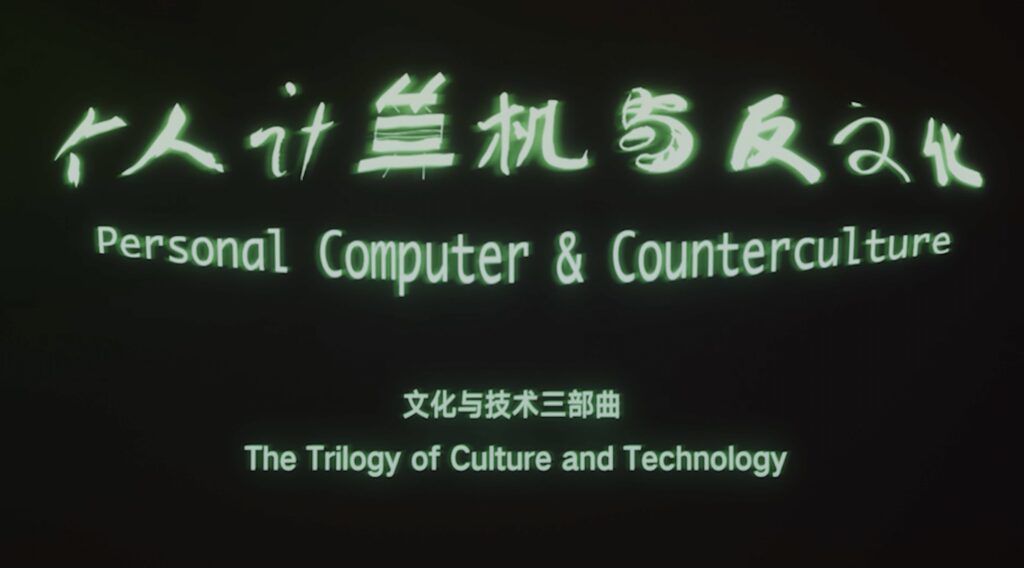
文化与技术系列采访影像源于“文化与技术三部曲”(The Trilogy of Culture and Technology)计划。本项目将在旧金山、深圳、新竹进行实地走访与拍摄。企图描绘出全球电子产业之新图景,无能理解这金三角的技术创新与资金流动,各自文化代表的视野,就无能理解当今电子脉冲的星球。
“个人计算机与反文化”(Personal Computers & Counterculture)篇章将讲述技术如何作为文化政治的产物,从个人与集体政治相互校准的斗争中而出现。本篇提取个了人计算机发展史中社会运动的基因,通过走访美国旧金山及其周边地区的遗迹,访问学者、前学生运动参与者、个人计算机开发者、技术行业从业人员,试图展现1960年代发源于北美的个人计算机是如何伴随着嬉皮士、学生运动、反文化运动、常青藤精英、LSD倡导者、摇滚乐手、科技乌托邦主义者、新公社派形成的技术─意识形态社群推广传播开来。此访谈系列,乃是每一部曲长片文本的前奏。
